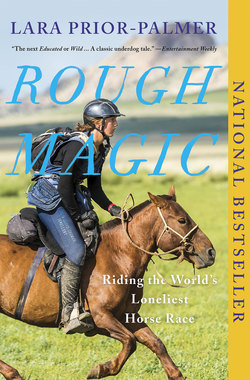Читать книгу Rough Magic - Lara Prior-Palmer - Страница 18
На сайте Литреса книга снята с продажи.
ОглавлениеX
On the bus out to the steppe, where we would spend two days pre-race training, I felt I had landed myself a comrade. Natacha (“My name is spelled with a C not an S, actually”) had grown up in Paris and, like me, had a handful of brothers. At nineteen, we were among the youngest competitors attempting the race. Our hasty friendship rested on these shared facts. She chattered with a darting, expectant expression as the city fell away out the window.
I had tried not to let anyone know my age. I was young, and young is foreign. Never trust a teenager. It was novel for me to be socializing with adults on equal terms, especially under the pretense that I could compete with them. The sport of horseback riding values experience more than youthful daring; athletes reach their peak later than they might do in other sports. Over the years, the average age of Mongol Derby competitors had been thirty-five. I feared no one would want to ride alongside a nineteen-year-old, although I’d heard that by the age of fourteen, Genghis Khan had killed one of his half brothers in a fight over hunting spoils—a horrid story, but a promising one too.
As Natacha talked on, I fell asleep. When I woke from my snooze, the bus had left the road to rumble across grassland. About 150 kilometers southwest of Ulaanbaatar, we drew into our training camp, a series of tents and a marquee lying beneath a crescent-shaped ridge. The ridge overlooked a vast plain draped in mist, beyond which mountains kept their distance. At night, as we lay in our little tents, the mist would increase, as if asking me to notice my dread.
That afternoon, though, we spilled from the bus and rushed to the tents like ducks to bread. I left my belongings on a patch of grass and glanced about. At the corners of my vision two horses were grazing. Green stretched in all directions, met at the horizon by blue sky. This seemed more of a space than a place, shapeless and free. I kept looking around expecting the ocean to roll in.
If there is one piece of furniture crucial to imagining the Mongolian steppe, it’s the ger, meaning “home” in Mongolian. Usually pronounced “gaire” without the long vowel (almost grr), it is the Mongolian equivalent of the Russian yurt: a white, circular felt tent that looks like a giant muffin crossed with a hot-air balloon. A ger is no bigger than your thumb in front of your face. Each one has a tin chimney sticking out of the center. There are no windows, for these are homes to turn you in on yourself, to let you forget the unkempt spaciousness outside them. Gers are cool in summer and warm in winter, when cow dung heats the central stove. A thin chimney takes smoke from the stove out of the top of the ger. For some shamans, this chimney is symbolic of the “world tree,” a link between the alternate realities of the underworld and the upper world.
Genghis (or, more correctly, Chinggis) Khan is also known as the “unifier of the people of the felt-walled tents” in Mongolian. Gers rarely change in size: this is not cottage versus castle. Before the communist takeover, the last ruler of Mongolia sipped tea in a ger as humble as everyone else’s.
A few times a year, nomadic families in Mongolia pack up their gers and move through the land in search of better pasture. Contrary to popular perception, nomads have fixed circuits—they are not drifters, and will return to similar places each year.
I imagine gers require less effort to move than brick houses, since they’re collapsible within the hour, and the families I would meet on my journey rarely had more than three. After their passing, apparently you would hardly know they’d been. The respect for nature, or baigal—“what exists”—is such that many Mongolians on the steppe wear shoes with soft, curved soles to spare the stalks of the tiniest plants and to avoid hurting the earth.
